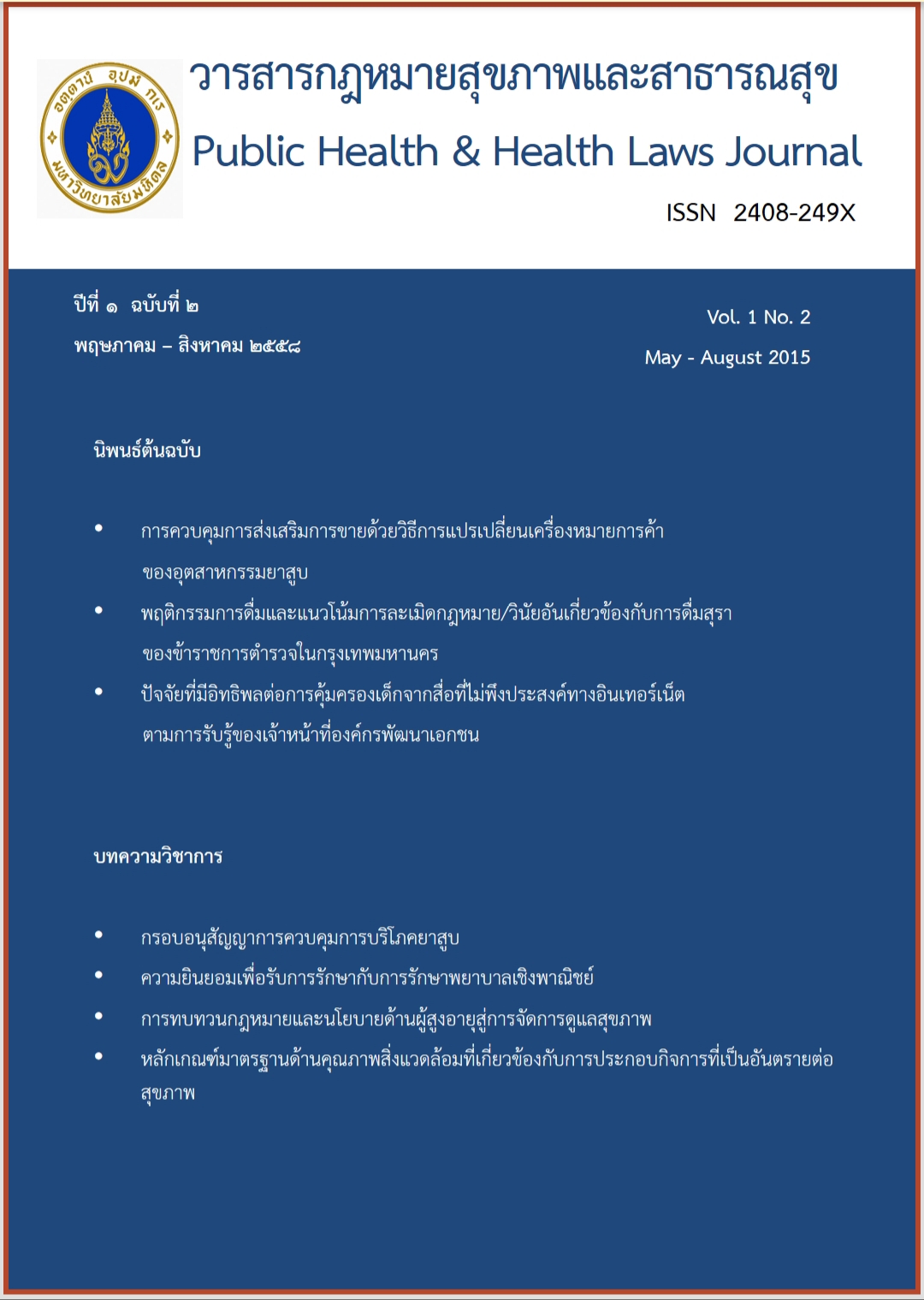Drinking Behavior and Tendency of Disobedience to the Laws/Disciplines Concerning Alcohol Consumption among Policemen in Bangkok
Keywords:
disobedience to the laws/disciplines concerning alcohol consumption, drinking behaviors, policemenAbstract
This research aims to study drinking behaviors and tendency of disobedience to the laws/disciplines concerning alcohol consumption among metropolitan policemen. The method was a survey quantitative research. The population was the police officers working in Bangkok metropolitan, both commissioned and noncommissioned officers. A multistage sampling technique, together with proportion to the population size of each police station and each commissioned rank, was used for obtaining the study sample. For data collection, the data was collected by using a self-administrated questionnaire. Finally for data analysis, there were 417 respondents completing the questionnaires.
This study found that about 50% of the respondents regularly consumed alcohol. Approximately one-third of them had been drinking alcohol since they were young. The three most reasons for the initiating were to socializing, just trying and imitating their friends. In addition for presently drinking, 90% of them claimed that they had to drink because of socializing. Three most popular alcohol beverages were beers, foreign brand spirits and Thai brand alcohol respectively. The most popular place for drinking was a restaurant (60.4%), and only 5.7% of them drinking alcohol in their workplaces. More than half of the respondents would like to join drinking with colleagues in the evening after work. Regarding the alcohol consumption assessment and developing by the Department of Mental Health, it was found that an estimated 38% of the respondents were at high risk of becoming alcoholic, and about 24% was classified as in the being in the group that drinking could cause them harm. When considering the tendency of disobedience to the laws/disciplines concerning alcohol consumption, it was found that about half of the respondents were in moderate-level group (53.7%), and there was a significant association between the tendency of disobedience to the laws/disciplines and drinking levels.
The findings suggest that drinking behavior among Thai policemen seem to be a major constrain of law enforcement as related to alcohol consumption control.
Keywords: disobedience to the laws/disciplines concerning alcohol consumption, drinking behaviors, policemen
References
จุรีย์ อุสาหะ และเศรณีย์ จุฬาเสรีกุล. (2548). สถานการณ์บริโภคเครื่องดื่มแอลกอฮอล์ในสังคมไทย. วารสารวิชาการสาธารณสุข, 14(1). หน้า 1-7.
บัณฑิต ศรไพศาล.(2549). การบริโภคเครื่องดื่มแอลกอฮอล์ของประเทศไทย. วารสารคลินิก, 22 (1มกราคม 2549). 7-13
บัณฑิต ศรไพศาล, จุฑาภรณ์ แก้งมุงคุณ, กมลา วัฒนาพร, โศภิต นาสืบ, แววดาว พิมพ์พันธ์ดี และกัณณพนต์ ภักดีเศรษฐกุล.(2551). รายงานสถานการณ์สุราปี 2551. ศูนย์วิจัยปัญหาสุรา กรมสุขภาพจิต กระทรวงสาธารณสุข นนทบุรี.
ประสาร อิ่มสมบัติ (2536). ปัจจัยที่มีผลต่อความแตกต่างของการกระทำผิดวินัยของข้าราชการตำรวจชั้นประทวนและพลตำรวจ ในสังกัดกองบังคับการตำรวจนครบาลธนบุรี. ปริญญานิพนธ์การศึกษามหาบัณฑิต, มหาวิทยาลัยมหิดล. นครปฐม.
รณชัย คงสกนธ์ และนฤมล โพธิ์แจ่ม. (2550). การดื่มสุราแบบอันตรายกับปัญหาความรุนแรงในครอบครัว ไทย : ศึกษาเปรียบเทียบระหว่างกลุ่มศึกษาและกลุ่มควบคุมแบบจับคู่. วารสารสมาคมจิตแพทย์แห่งประเทศไทย 2550, 52(3), 296–305.
สถาบันวิจัยเพื่อการพัฒนาประเทศไทย. (2547). หน่วยจัดการความรู้เพื่อความปลอดภัย
สุมนทิพย์ ใจเหล็ก. (2546). รายงานการวิจัยความรุนแรงในครอบครัวกับการกระทำผิดของเด็กและ เยาวชน
Davey, J. D., Obst, P. L. & Sheehan, M. C. (2001). It Goes with the Job: officers’ insights into the impact of stress and culture on alcohol consumption within the policing occupation. Drugs: education, prevention and policy, 8(2)
Hjelle, L.A. and Ziegler, D.J. (1992). Personality Theories : Basic Assumption, Research, and Application. The social cognitive perspective in personality theory : Albert Bandura and Julian Rotter. 336-385.
Julian B. Rotter (1982). The development and application of social learning theory. Social Learning and Clinical Psychology, 40-80.
Krejcie, R. V. & Morgan, D. W. (1970). Determining sample size for research activities. Educational and Psychological Measurement, 30, 607-610.
Downloads
Published
How to Cite
Issue
Section
License
Disclaimer and Copyright Notice
The content and information presented in articles published in the Journal of Law and Public Health Policy represent the opinions and sole responsibility of the respective authors. The editorial board does not necessarily agree with or assume any responsibility for the views expressed.
All articles, data, content, images, and other materials published in the Journal of Law and Public Health Policy are the intellectual property of the journal. Any individual or organization wishing to reproduce, distribute, or otherwise use the entirety or any part of such materials must provide proper citation.





